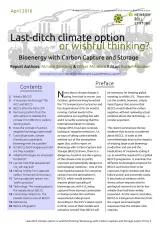Last-ditch climate option or wishful thinking?
News about climate change is going from bad to worse: Last October, global warming breached the 1oC temperature rise barrier for the first time ever, and they have stayed above it for six months running. Carbon levels in the atmosphere are anything but safe and it is hardly surprising that the International Panel on Climate Change (IPCC) has been seriously looking at ‘negative emissions’, i.e. at ways taking carbon already emitted out of the atmosphere again. But, as this report on Bioenergy with Carbon Capture and Storage (BECCS) shows, there is a dangerous trend to use the urgency of the climate crisis to justify unproven and potentially dangerous technological ‘solutions’. One of the most hyped proposals for removing carbon from the atmosphere is BECCS: It would involve a massive global upscaling of bioenergy use, with CO2 being captured from biomass combustion or biofuel production and then sequestered underground. According to the IPCC’s latest, 2014, report, most of their models and scenarios ‘proved’ that BECCS will be necessary for keeping global warming to within 2oC. Those who ran the models, however, simply input figures according to which BECCS would indeed be carbon negative, without actually reviewing the evidence about the technology – a circular argument.
This report summarises the key evidence which must be considered about BECCS. It looks at the overwhelmingly destructive impacts of existing large-scale bioenergy production and use and the implications of massively scaling it up, as would be required for a global BECCS programme. It examines the different technologies proposed for BECCS and shows them to be unproven, highly complex and thus failure-prone, and extremely costly. And it looks at the evidence which shows carbon sequestration in geological reservoirs to be far less reliable than had been widely thought. As the report concludes, BECCS is a dangerous diversion from the urgent and meaningful responses that the climate crisis requires.
The full report is available here.
Product details
Table of contents
1. What is BECCS?
2. A necessary technology? The IPCC and BECCS
3. BECCS after the Paris COP
4. Removing carbon from the atmosphere to stabilise the climate: from BECCS to Carbon- Sucking Aliens
5. Does the concept of carbonnegative bioenergy make sense?
6. Could large-scale, climate friendly and sustainable bioenergy ever be possible?
7. Do BECCS technologies exist and are they scalable?
8. What technologies are proposed for BECCS?
9. Can we trust that sequestered
10. CO2 will stay put?
11. Making money from captured carbon: Enhanced Oil Recovery Turning captured carbon into ‘useful products’
12. Technology: The missing piece in the debate about BECCS
13. Concluding reflections: The pseudo-science around BECCS
14. References
15. BECCS Infographic
